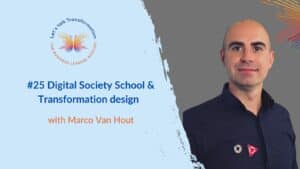“in order for us to understand the future we can’t lose the connection to the past”
Anna and I discuss evolution of humans and the workplace, the rise of the ‘no collar’ economy and how the pandemic has redefined our relationship to work. We look at the cycle of permanent reinvention around human systems, industrial systems and technology, and the factors driving the dramatic changes in the workplace : digitisation of work, distributed workplaces, organisational redesign and the changing workforce.
The ethical point about technology serving the collective good of humanity means that empathy is critical in the workplace. How do we manage the ever evolving barriers of ethics and empathy ? Relationships used to be so well-defined, but post-pandemic we are set to be in a long-lasting state of flux. How do we make sure that we can remain human at work as technology evolves and enact empathy at scale?
Anna shares her research, insights and learnings from her new book and continued work on this topic with leaders and businesses around the globe.
The main insights you will get from this episode are :
- The pandemic has redefined our relationship to work, and no relationship has changed more than that between employer and employees.
- To understand the future of work, we must look to the past, and artisanal communities – how they worked at home, created, involved entire families, had a holistic experience of work – all this is now extremely relevant.
- We now have a ‘no-collar’ economy with work coming to the workers and one in which people are required to do jobs regardless of ‘collar’ – technology (together with the pandemic) has rendered collars superfluous.
- Technology is becoming increasingly integrated in and absorbed by humanity (e.g. invisible technology in smart sports clothes) and in the workplace, too, it will no longer be ‘the other’, but an integral part of how we work.
- Permanent reinvention speeds everything up and presents a challenge for humans: what does all this mean for the experience aspect (e.g. UX, DX, etc.)? The metaverse and VR make everything about the experience. Our enhanced understanding of how to ‘hijack’ human wiring makes us very aware of the ethics surrounding our choices regarding technology.
- The ethical point about technology serving the collective good of humanity means that empathy is critical. This was clearly visible in organisations during the pandemic (e.g. mass firings on Zoom); how companies treated their employees became pivotal and, moreover, a public display of empathy at scale.
- How do we deploy empathy in organisations? There were historically many detractors of empathy; it was considered negative and anti-capitalist as something that might take focus away from the bottom line, for example.
- Empathy will be the primary driver of economy because it is the gateway to inclusion, i.e. understanding the position of others. AI and VR allow us to better teach empathy by offering first-hand experiences of walking in the shoes of others, thereby making it tangible.
- We must transcend analytics and make work more experiential and emotional – the current frontier of technology. Robots will seek to involve humans when the level of uncertainty requires it, but how quickly will we know that we are interacting with a robot, not a person?
- This length of time is increasing as machines personalise responses through machine learning and natural language processing. But the emotional component of interacting with a human will be at a premium – empathy, creativity and creation will keep us relevant.
- How will we personalise machines? Should we create robots that look like humans? We will then start to relate to them as companions. If machines respond emotionally, what rights will they have? Will we develop protections towards these new members of our community? Is this part of inclusion?
- How do we scale empathy and human experience at work? The platform model allows apps/tools to be plugged in based on the same logic that helps deliver at scale (e.g. as coaching, mental health and mentoring services moved online during COVID).
- High-touch engagement will be delivered through new platform-based technology and be employee-facing, capturing the holistic experience and delivering a more inclusive model that democratises access to skills for employees.
- Technology must evolve to a higher level of individualisation to deliver custom services. We are seeing the limit of human capacity/intelligence and are already outperformed in some areas. We must re-evaluate what we are better at and outsource the rest to machines whilst remaining mindful of ethical issues.
- To build a workplace for tomorrow, we must pay attention to where the technology is going, and to employees. Relationships used to be so well-defined, but post-pandemic we are set to be in a long-lasting state of flux.
- Hard skills will be critical, but redefined, once again highlighting the very dynamic relationship between employees and employers. Businesses must help employees answer their questions by listening to them – only a collaborative approach will do.









